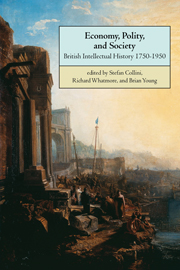Book contents
- Frontmatter
- Contents
- Preface
- General introduction
- Presentation of Economy, Polity, and Society
- Part I
- 1 Sociability and self-love in the theatre of moral sentiments: Mandeville to Adam Smith
- 2 ‘That noble disquiet’: meanings of liberty in the discourse of the North
- 3 Language, sociability, and history: some reflections on the foundations of Adam Smith's science of man
- 4 Adam Smith and tradition: the Wealth of Nations before Malthus
- Part II
- Part III
- List of contributors
- Acknowledgements
- Index
2 - ‘That noble disquiet’: meanings of liberty in the discourse of the North
Published online by Cambridge University Press: 18 December 2009
- Frontmatter
- Contents
- Preface
- General introduction
- Presentation of Economy, Polity, and Society
- Part I
- 1 Sociability and self-love in the theatre of moral sentiments: Mandeville to Adam Smith
- 2 ‘That noble disquiet’: meanings of liberty in the discourse of the North
- 3 Language, sociability, and history: some reflections on the foundations of Adam Smith's science of man
- 4 Adam Smith and tradition: the Wealth of Nations before Malthus
- Part II
- Part III
- List of contributors
- Acknowledgements
- Index
Summary
In spite of recurrent criticism, Isaiah Berlin's famous distinction between two concepts of liberty maintains its grip on the imagination of Anglo- American political historians and philosophers. Perhaps it does indeed capture a genuine difference between ‘two … families of conception of political freedom abroad in our civilisation’. Yet there is more to liberty than meets the conceptual eye.
Berlin admitted that negative and positive liberty ‘start at no great logical distance from each other’, though they address two slightly different questions: ‘who is master?’ and ‘over what am I master?’ When taken together, answers to these questions give content to any perception of what it means to be free. In more recent phases of European history, however, the negative and positive conceptions were progressively subject to ‘fission’ by means of a separation of ‘higher’ and ‘lower’ conceptions of the self which resulted in positive liberty becoming identified with something different: with authority and with the moral conditions for liberty itself. Hence the recurrent temptation to those writers whom Berlin takes to be metaphysically and holistically inclined to sacrifice the ‘real’ for the ‘ideal’ self.
Scottish intellectual history during the eighteenth century possesses various advantages in any attempt to locate the moment when Berlin's two questions began to separate – or, as will be contended here, they do not entirely do so. The period has been identified as one such moment, with recent political historiography being divided over whether a jurisprudential or a republican paradigm can best capture the intellectual context of the Scottish science of society and politics, with the former emphasising negative, and the latter positive understandings of liberty.
- Type
- Chapter
- Information
- Economy, Polity, and SocietyBritish Intellectual History 1750–1950, pp. 48 - 69Publisher: Cambridge University PressPrint publication year: 2000
- 3
- Cited by



